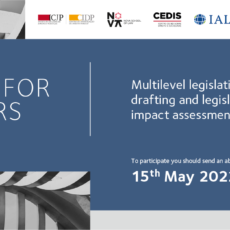
The ignorance or misinterpretation of the law does not justify the lack of compliance or exempt people from their respective sanctions. But how many people will actually know the legislation that is in force in your country?
Despite the ease of passing on information these
days in an absolutely global and open world, with tried-and-true mechanisms for
universal and free access to ongoing legislative initiatives and legislative
acts already adopted, the general public only knows the legislation most
discussed and reported by the media or that generate more social controversy
and debate.
There is a clear gap between the plan of producing legislative acts and their knowledge by those who are obliged to comply with them.
In any Democratic Rule of Law, it is essential that the legislative power is known by all and is monitered by citizens. The “democratic accountability” is a sine qua non condition of a democratic rule of law. However, unfortunately, this public information does not reach the recipient for several reasons. Either due to a lack of clarity of the rules or a complete dispersion of laws.
As an example, initiatives from civil society, such as in Portugal, the case of hemiciclo.pt, which aims to simplify public oversight of the exercise of parliamentary mandate, making it possible to follow the votes of a certain Member of the Portuguese Parliament.
On the other hand, the Academy can play a very important role in the link
between better regulation and civil society. Following the case of
Portugal, the Portuguese Legislation Observatory
was created with the aim of contributing to the quality of the legislative
policy and more recently it intends to elaborate a relational database of Portuguese
legislation, which will allow the visualization, for each legal diploma, of all
information relating to all other legal diplomas related to it.
However, the ignorance of the law may also arise from the usual frenzy of legislative changes or from the existence of rules spread across several pieces of legislation. It is therefore essential that these potential risks are taken into account before adopting new legislation.
Institutions such as the EU, the OECD and the World Bank now devote part of their efforts to the development and support of better regulation and smart legislation programs, drawing up recommendations on ‘better lawmaking’ and pursuing objectives of legislative simplification and administrative modernization in order to improve the quality of legislation and regulation and to assess before and after the impact of each legislative act.
It is therefore important to assess how the legal diplomas can be written with relevance, clarity and simplicity. The advantages that result are evident.
This is precisely the purpose of the Portuguese research project: Common Rules of Legal Drafting in the Portuguese-Speaking Countries and Regions of the Lisbon Center for Research in Public Law of Lisbon’s Law School, which aims to find common ways of “writing legislative acts” and whose main objective is to define of common criteria, standards and rules of law for Portuguese-speaking countries and regions, in order to better understand the applicable legislation in a given legal system.
It facilitates an understanding of citizens’ rights and duties, simplifies access to legislation that will be applicable to investors and thus allows citizens and companies in the states and regions where Portuguese is the official language to be more easily invest.
These initiatives, which come from public authorities, civil society or the Academy, help citizens to be more easily aware of the legislation in force in their country and from which they are inevitably addressed and, therefore, to take informed decisions.
And it is only with the widespread knowledge and scrutiny of citizens that society has the true power to effectively oversee democratic institutions as it is their right. In this way the democratic process is certainly more legitimized.
Read the full article here.





